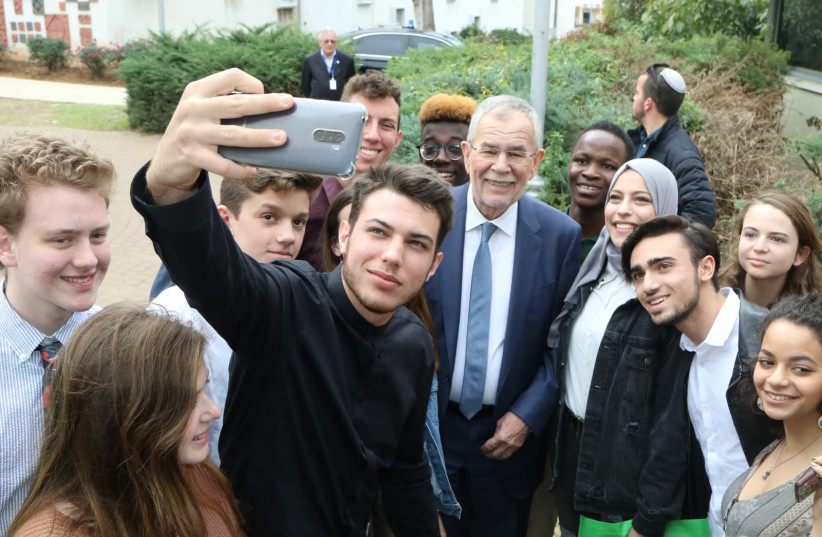Michal Sella began her new position as executive director of Givat Haviva only a few weeks before the May conflict triggered by Hamas, a genocidal terrorist group, against Israel spilled over into unprecedented violence between Arab and Jewish Israeli citizens. The clashes in the country’s mixed cities portended a huge setback in the work of many civil society organizations to impart the values of a shared society in both communities.
But in sharp contrast to the violence between Arabs and Jews in Israel in September 2000, the bounce back in 2021 was much quicker. “After the May violence, a huge number of Jewish schools asked for our shared programs,” says Sella. “Every Jewish kid in Israel is going to live in a society that is 20% or more Arab. They will live in a shared society.”
Bringing Israeli Arab and Jewish youths together, usually at the Givat Haviva Seminary’s 40-acre campus, has long been a staple element of the organization’s pioneering efforts since its founding in 1949 to deepen and advance majority-minority relations in Israel. These programs, so critical because Arabs and Jews attend different school systems until university, were generally put on hold since March 2020 due to the coronavirus pandemic. In-person programs resumed only a few months ago, in September.
Givat Haviva and other civil society organizations focused on Jewish-Arab relations have been pressing the Education Ministry for greater government investments in this area. “There is no official curriculum for shared society,” Sella noted.
“Israel is only spending NIS 2 million, about $600,000, on educational meetings between Jews and Arabs,” says Sella. “Only 0.4% of the youth in Israel will meet the other side. Youth have to meet each other.” She has been meeting with senior Education Ministry officials, encouraging them to develop a plan that will formally address the issue of shared society education.

The nonprofit organization relies on the support of the Kibbutz Federation, as well as foundations and individual supporters in the United States, where it maintains an office in New York as well as one in Europe.
Its traditional encounters programs received a recent boost when several parties in the current government decided to allocate some of the funds they receive as coalition members to advance their interests. “Thanks to Labor and Meretz support, the Givat Haviva budget for Jewish-Arab encounters is doubling to NIS 4m.,” said Sella.
Though Sella did not come to head Givat Haviva on the path charted by her predecessors, all of whom came from kibbutzim, she is imbued with energy and optimism. Growing up in Jerusalem, she was involved in Hashomer Hatzair, a kibbutz youth movement, and now lives in cosmopolitan Tel Aviv, commuting to Givat Haviva. She is the youngest person to serve as executive director and the second female.
Engaging the Education Ministry in shared society is a top priority for her. One of Givat Haviva’s largest programs – started eight years ago – brings Jewish teachers into schools in Arab towns and villages to teach spoken Hebrew. It’s an important initiative since Arab students generally study biblical Hebrew and do not graduate with the skills to communicate in everyday modern Hebrew.
“Arab students need to know Hebrew at a good level, to be part of our economy, our workforce,” she says.
The Education Ministry has been a partner with Givat Haviva in this program which currently operates in 70 Arab schools across the country, from the Galilee to the Negev. “We are hoping that next year the Education Ministry will take over the program,” she told me. “We hope it will be operating in all of the Arab middle schools in Israel.”
Jewish competency in Arabic also is important. While Givat Haviva offers a three-month course to study Arabic, to reach the broadest youthful population, Sella strongly recommends that placing an Arab teacher in every Jewish school to teach spoken Arabic should be part of an Education Ministry shared society plan.
Other issues, in addition to education, are vital too because adversity within Arab society in Israel has an impact on the Jewish population. The magnitude of violent crime in Arab communities, where more than 100 Arabs citizens have been murdered by other Arabs in 2021 alone, has finally gained national government and police attention. The government’s budget provides for $2.5 billion shekels to address this crisis collaboratively with Israel Police, the Justice Ministry and Arab municipalities.
To help fight crime, Givat Haviva is launching five mediation centers in Arab cities and villages next year. The mediators, trained by Givat Haviva, will seek to resolve disputes between families to avert violence.
Further, the director-general of the Public Security Ministry, second to the minister, recently met with local Arab leaders for four hours at Givat Haviva. “The Arab participants were moved that the ministry of police for the first time asked them what they think,” said Sella.
The potential for further improvement of Jewish-Arab relations in Israel is promising, given the participation of an Arab party, Ra’am, for the first time in the governing coalition. The role of non-governmental organizations like Givat Haviva in shaping Jewish-Arab understanding and cooperation has long been and will continue to be an important factor in strengthening Israel’s democratic society.
The writer is the American Jewish Committee’s director of media relations.
